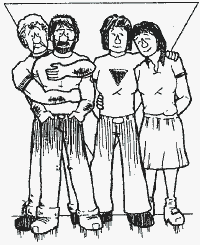
Cartoon drawn for Integrity by Sean Martin, copyright 1995.
A family is a group of often very different persons with a spiritual affinity that brings and keeps them together. Over the centuries there have been many types of family. Some examples are:
|
The affinity which binds family members may have many forms. It may be the blood relationship which makes the special bond many of us have experienced. It may be the legal and institutional tie of marriage, which can hold a family together "in both prosperity and adversity" (BCP p564). It can include the responsibility for children. Sometimes it is simply a fondness -- the sort of bond there is with a "courtesy aunt or uncle" -- which cannot be defined by law or by canon, but which still exists.
The essential for any surviving and healthy family is love. Newspapers today are filled with stories of families which end disastrously because they are no longer -- or perhaps never were -- founded on the necessary mutually covenanted love described in the marriage service.
God created humans with both the ability to love and the need to be loved. Adam, the original human, was perfect but lonely; indeed in the whole story of Creation the only thing which was "not good" is that a human should be alone (Genesis 3:18). When Adam's partner was created, they both recognised the goodness of the relationship. It is the intimate partnership which was the stated purpose of the relationship. Procreation came later, perhaps as an accidental result of their God-given intimacy.
The Church has much to say about relationships between people of all types. In particular, it emphasises the spiritual, social and psychological value of commitments, and is therefore concerned about their establishment, maintenance and quality. General Synod Canon XXI describes marriage as:
"a lifelong union in faithful love, for better or for worse, to the exclusion of all others on either side. This union is established by God's grace when two duly qualified persons enter into a contract of marriage in which they declare their intention of fulfilling its purposes and exchange vows to be faithful to one another until they are separated by death. The purposes of marriage are mutual fellowship, support, and comfort, the procreation (if it may be) and nurture of children, and the creation of a relationship in which sexuality may serve personal fulfilment in a community of faithful love."
Gay and lesbian people have the same need for that God-given, intimate relationship. Recognising the "not-goodness" in God's eyes of a lonely lifestyle, they do form such relationships and families. The Church needs to address this with same-gender couples the same way it treats other couples, welcoming them as an indigenous part of Christ's flock. Canon XXI goes on to say that "Marriage also is exalted as a sign of the redeeming purpose of God to unite all things in Christ, the purpose made known the reunion of divided humanity in the Church." Indeed, everything in the description quoted from Canon XXI could apply to lesbian / gay couples -- who sometimes also raise children.
Official Church pronouncements about same-gender unions vary. It is interesting to note that a number of Anglican bishops have authorised the priestly blessing for such unions This was the rationale for one such ministry, in the diocese of Rochester, NY:
"For centuries the Church has blessed many things and many occasions. The Church blesses friendships, families and any two individuals who wish to commit their lives to each other and to Jesus Christ. The Church acts appropriately in the best interests of the faith when it confers a blessing of commitment upon two individuals of the same gender when they seek to share a life together and to grow in the grace of God. Whether in Matrimony or in the blessing of a particular couple's commitment, the Church does not specifically bless an orientation or a particular mode of sexual behaviour. The Church, however, blesses persons, regardless of orientation, who claim Jesus Christ to be their Lord and Saviour and who commit themselves as individuals or couples to the fellowship of the Church."
Cardinal Hume, senior Roman Catholic prelate in England, makes his church's position clear: "Love between two persons, whether of the same sex or of a different sex, is to be treasured and respected."
The cardinal went on to say that love between two people of the same gender is not automatically wrong and bad:
"When two persons love, they experience in a limited manner in this world what will be their unending delight when one with God in the next
"To love another is in fact to reach out to God, who shares his loveableness with the one we love. To be loved is to receive a sign or share of God's unconditional love. To love another, whether of the same sex or of a different sex, is to have entered into the area of the richest human experience."
The people of God are called to assert that it is God who brings all persons together, whether in simple friendship or in lifelong intimacy, and that humans are forbidden to put them asunder. The world, the flesh and the devil work to destroy loving friendships. Let's acknowledge that couples and families, whatever the shape of the relationship, need the Church's formal and official support, in God's name.
![]()